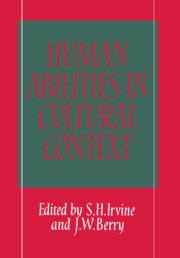Book contents
- Frontmatter
- Contents
- List of contributors
- Preface
- Acknowledgments
- Part I Human abilities in theoretical cultures
- 1 The abilities of mankind: A revaluation
- 2 A triarchic view of intelligence in cross-cultural perspective
- 3 The biological basis of intelligence
- 4 Speed of information processing and population differences
- 5 The factor model as a theoretical basis for individual differences
- 6 The meaning of item bias in ability tests
- Part II Cultural responses to ability measurement
- Part III Cultural limits upon human assessment
- Author index
- Subject index
2 - A triarchic view of intelligence in cross-cultural perspective
from Part I - Human abilities in theoretical cultures
Published online by Cambridge University Press: 13 January 2010
- Frontmatter
- Contents
- List of contributors
- Preface
- Acknowledgments
- Part I Human abilities in theoretical cultures
- 1 The abilities of mankind: A revaluation
- 2 A triarchic view of intelligence in cross-cultural perspective
- 3 The biological basis of intelligence
- 4 Speed of information processing and population differences
- 5 The factor model as a theoretical basis for individual differences
- 6 The meaning of item bias in ability tests
- Part II Cultural responses to ability measurement
- Part III Cultural limits upon human assessment
- Author index
- Subject index
Summary
The time is 8:00 A.M. The place is Guayana Ciudad, Venezuela. An important inter-American meeting on intelligence and its improvement is scheduled to begin. Close to 100 people should be in the room. In fact, only a handful are there. The handful is not a random sample of the scholars invited to attend the meeting. To the contrary, it constitutes the North American contingent at the meeting. None of the South or Central Americans have arrived. After about a half-hour, the others start to trickle in slowly, but it is not until almost two hours have passed that the meetings truly get under way. By the end of the series of meetings, no one arrives at the scheduled time when a given meeting is to begin. Learning has taken place: The North Americans have learned not to arrive on time. More generally, they have learned something about adaptive behavior in Venezuela. And more importantly for them, they have learned that in Venezuela, it is often, in some sense, unintelligent to arrive at a time when a meeting is scheduled to begin, unless one wishes to kill time.
The North American investigators are surprised: The adult Kpelle tribesmen seem unable to sort nouns taxonomically. Rather, they sort them functionally, the way children would in the western world. Moreover, the tribesmen resist hints that should lead them to sort taxonomically. Evidence, perhaps, for the intellectual superiority of North Americans and Europeans over the African tribesmen? It would appear so. But then, in desperation, one of the investigators asks the Kpelle to sort the way stupid people would.
- Type
- Chapter
- Information
- Human Abilities in Cultural Context , pp. 60 - 85Publisher: Cambridge University PressPrint publication year: 1988
- 19
- Cited by

